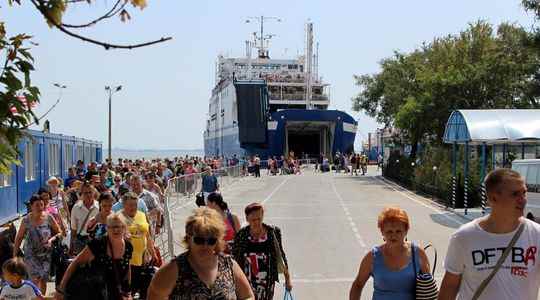Should the entry of Russian tourists into European Union (EU) member countries be banned in order to punish Moscow for the invasion of Ukraine? This is what Volodymyr Zelensky ardently wishes. “The strongest sanction would be to introduce visa restrictions for citizens of the Russian Federation”, reaffirms the Ukrainian president in an exclusive interview with L’Express.
The Czech Republic, which holds the rotating EU presidency, will put this issue on the menu of the meeting of European foreign ministers on August 30-31 in Prague. If the Czech government no longer issues visas to simple Russian nationals, other countries are on the other hand unfavorable to this measure, such as Germany, and the Europeans are therefore advancing in dispersed order. For Cyrille Bret, researcher at the Jacques-Delors Institute, the EU “has no interest in alienating 146 million Russians”.
L’Express: Is the ban on Russian tourists in the EU likely to be adopted by the Twenty-Seven?
Cyrille Bret: In terms of entry and stay in the territory, the unanimity of the Twenty-Seven is required. The chances of success of this proposal are therefore limited. This measure needed to be put on the agenda of the EU Council. I believe it is on the agenda for good reasons, as it is shocking to see so many Russian tourists in Europe.
But, at the same time, this ban is unlikely to succeed and for very good reasons because it would be a real break. This measure is in contradiction not only with the fundamental principle of freedom of movement in the EU but also with the European sanctions which have so far been directed against a state apparatus and not against a population.
Some countries have already introduced restrictions, such as Finland which has decided to reduce the number of visas issued by 10% from September 1, the Czech Republic as well as the Baltic countries and Poland which have tightened since the start of the offensive their visa regime for Russians. On the other hand, other states do not look favorably on possible sanctions and do not intend to penalize the Russian people…
It is true that the argument which consists in not wanting to sanction an entire people is very strong. If this measure were adopted, it would be a collective punishment against an entire people. States such as France, Germany and Italy will defend a position of maintaining tourist visas for Russians by supporting very strong arguments from a legal point of view.
From a strategic point of view, this time, this prohibition would enshrine a break between Europe on the one hand and the Russian people on the other, which would present risks for the EU as a whole. The strength of the European Union is not its armies, its intelligence services, or its technologies: it is its ability to attract people. It is in the EU that Russians want to be educated, cared for, vacationed and invested. Moscow does not fear European armies but it fears European influence, it fears its ability to seduce and attract the Russians, so a ban would be a strategic absurdity. Strategically, the EU would therefore obtain exactly the opposite effect to that which is sought.
Furthermore, if you sanction a Russian oligarch and at the same time you sanction the owner of a Russian sports shop, then you create de facto solidarity between a member of the Putin system and someone who has nothing to do with this system. You can’t treat a senior Russian defense official and a gym owner the same way, otherwise it would be saying that they are all equally guilty, which is very debatable. In summary, the real interest of the EU is to sanction the Russian government and not to alienate the 146 million Russians because if you do, then you deprive Europe of its great capacity.
Can the ban on Russian tourist visas, however, seduce a good part of public opinion in European countries?
Public opinions, especially those in the Nordic countries and the countries of Eastern Europe, are inhabited by a great feeling of solidarity with Ukrainian civilians. This solidarity is also translated into actions, it is not only done in the media sphere. We can therefore think that this ban on tourist visas for Russians appears to be a measure of common sense for public opinion. It would be a sign of additional solidarity with the Ukrainian civilians who need it.
